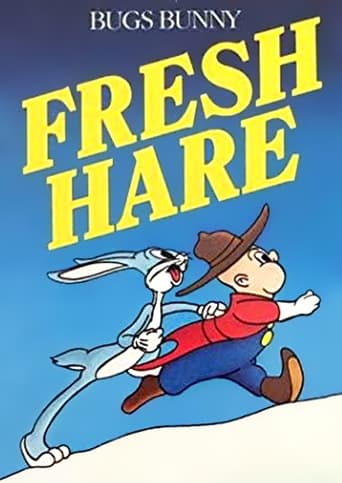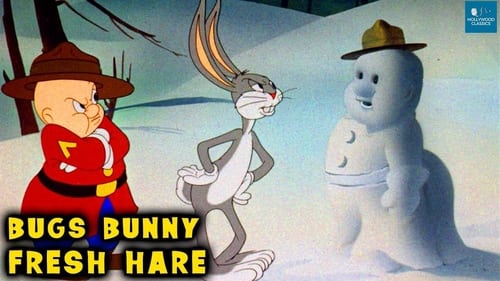TheLittleSongbird
Bugs and Elmer always work well together and are enough to brighten up a hard day. And Fresh Hare, a very early effort(one of their first I believe), is no exception. Bugs is as crafty yet likable as he ever was, and while somewhat smarter than usual Elmer contrasts and works to great effect with him. Mel Blanc and Arthur Q. Bryan voice them impeccably. Several other great things work in Fresh Hare's favour. The animation is detailed and luscious, of course Elmer is fatter than we usually see him and Bugs more elongated but they are still well drawn within this stage in Looney Tunes animation. The music is full of energy and character, and is always pleasant on the ears. The dialogue is as witty and funny as ever, and the gags are clever and imaginative. The story is simple but with never a dull spot, it is fun all the way through. I do agree though that the ending is random and rather awkward(some may also find it tasteless). Overall with this in mind, Fresh Hare is great. 9/10 Bethany Cox
SnydleyDownDeep
"Dixie" was a film released around the same time as this cartoon; it starred Bing Crosby, one of the biggest stars at the time. (Look up "Dixie (1943)" on IMDb for more info about the movie.) Most people in the audience of the cartoon would have been familiar with the movie, and the movie has the cast doing minstrel shows in black face. So at the end of the cartoon, when Bugs says "I wish I was in Dixie" and they cut to the cartoon characters doing a minstrel show in black face, the joke is that Bugs is wishing he were in the movie "Dixie".Many of the Looney Tune and Merrie Melodie cartoons contain jokes that would have been relevant to the audience at the time. Unfortunately, when the cartoons are viewed 60-70 years later, same jokes no longer make sense. So when something seems completely random (like the ending to this cartoon), have faith that it meant something at the time the cartoon was released.
theowinthrop
This is really a funny cartoon, but it suffers for the last few seconds which, in our age of political correctness, have been removed so as not to offend African-Americans.Elmer is a Mountie, who is trying to capture Bugs. At the start he is viewing several trees with posters of Bugs, wanted dead or alive (but preferably dead). As he passes each tree, Elmer sees someone has been marking up the posters with comments and putting a mustache on Bugs' face (one of the posters, interestingly enough, puts a "Hitler" mustache on Bugs). Not every tree has these posters - one has an advertisement for the Mountie Police Gazette, with a voluptuous lady on the poster.Eventually Elmer finds Bugs' rabbit hole, and handcuffs himself to Bugs, only to find 1) the wascally wabbit has substituted a lit bomb to the handcuffs, and 2) has purloined Elmer's hand-key key. Helpfully Bugs tries to find the right key (there are five), but reaches it as the bomb goes off.Elmer chases Bugs all over the Canadian wilds, frequently he and Bugs crashing into the snow banks and leaving their images in the banks to show they were there. But Bugs is always faster - managing to end up chasing Elmer once, and also managing to get his two ears to go around a tree that he has to pass (Elmer crashes into the tree, and ends up looking like Santa Clause).At one point Bugs insists on knowing what he is wanted for - Elmer reads a list of charges, including jay walking and being a pest, and (as mentioned in the "Summary Line" above, conduct unbecoming a rabbit. Although Elmer does not catch Bugs, he is so miserable he cries for his failure, and Bugs feels sorry enough for him to give himself up. Elmer is in charge of the firing squad, and asks if Bugs has any last wishes. Here is the point where the cartoon is tampered with today. Bugs says, "I wish...I wish...I wish I was in the land of Cotton, old times there are not forgotten." At this point Elmer and the firing squad look amazed at this unexpected wasting of a wish. But as the cartoon originally ended, Elmer, Bugs, and the members of the firing squad reappear as minstrels singing "Dixie". Curiously, when I saw the original ending, it did not strike me as being worth saving. It made absolutely no sense - but then so would the current ending of Bugs bursting into song in front of a surprised firing squad. If you think of the anarchistic humor of the Warner's cartoons either is acceptable, but not particularly clever. As pointed too, Elmer was drawn as a fat person here - for the last time, complete with corset. In fact the fat headed, bald Fudd of the later cartoons is quite an improvement too.
Chip_douglas
You know the quality is going to be above average when a cartoon starts with an big orchestral intro and a still picture to complement the titles. Bugs Bunny, looking slightly less cute than he would in later years (and still having to be content with his name under the titles) evades and tricks Elmer the Mountie at every turn. Back in these days Elmer was so overweight he had to wear a girdle. But if you look closely you can actually see him sweating off those pounds during the wild chase scenes.In the forties the Warner Studios were still competing with Disney to produce the best looking animation around. It is obvious a lot of thought and care went into the backgrounds and character animation. Yet they still could not compare to the competition. However when it came to gags the Merry Melodies were unbeatable. There are probably more jokes crammed into these 7 minutes than in any 7 Disney cartoons of the same era. Only the final scene involving a black and white minstrel show feels a bit awkward nowadays, for we like to forget that these totally incorrect programmes ever existed. In fact it was not until the late Sixties that this type of shows was banned, about the same time the Merry Melodies ended their run.
7 out of 10



